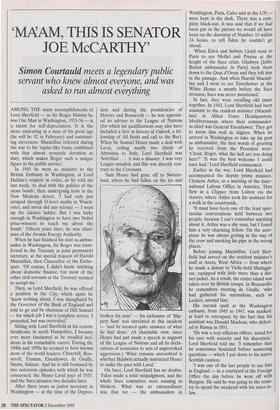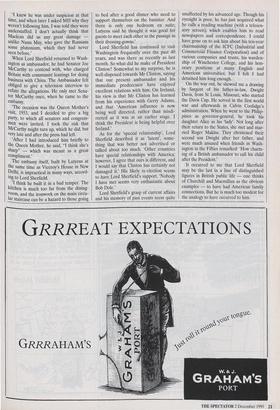‘MAAM, THIS IS SENATOR JOE McCARTHY'
Simon Courtauld meets a legendary public
servant who knew almost everyone, and was asked to run almost everything
AMONG THE many accomplishments of Lord Sherfield — as Sir Roger Makins he was Our Man in Washington, 1953-56 — is a talent for self-depreciation. It is the more endearing in a man of his great age (he will be 92 in February) and outstand- ing cleverness. Macmillan referred during the war to his 'rapier-like brain, combined with that almost monastic devotion to duty, which makes Roger such a unique figure in the public service'.
In 1945 he went as minister to the British Embassy in Washington, at Lord Halifax's request in order, as he told me last week, `to deal with the politics of the atom bomb', then undergoing tests in the New Mexican desert. 'I had only just scraped through 0-level maths at Winch- ester, and never did any science — I went up the classics ladder. But I was lucky enough in Washington to have two Nobel prize-winners to teach me about the bomb.' Fifteen years later, he was chair- man of the Atomic Energy Authority.
When he had finished his stint as ambas- sador in Washington, Sir Roger was trans- ferred to the Treasury as joint permanent secretary, at the special request of Harold Macmillan, then Chancellor of the Exche- quer. 'Of course, I didn't know anything about domestic finance, but most of the other civil servants at the Treasury seemed to accept me.'
Then, as Lord Sherfield, he was offered a position in the City, which again he `knew nothing about. I was shanghaied by the Governor of the Bank of England and told to go and be chairman of Hill Samuel — for which job I was a complete novice. I protested, but was overruled.'
Sitting with Lord Sherfield at his remote farmhouse in north Hampshire, I became ever more fascinated as he recalled inci- dents in his remarkable career. During the 1940s and 1950s he seemed to have known most of the world leaders: Churchill, Roo- sevelt, Truman, Eisenhower, de Gaulle, Smuts, Salazar. And he is still bemused by two notorious episodes with which he was concerned: the Hoare-Laval pact of 1935, and the Suez invasion two decades later.
After three years as junior secretary in Washington — at the time of the Depres- sion and during the presidencies of Hoover and Roosevelt — he was appoint- ed an adviser to the League of Nations (for which his qualifications may also have included a first in history at Oxford, a fel- lowship of All Souls and call to the Bar). When Sir Samuel Hoare made a deal with Laval, ceding nearly two thirds of Abyssinia to Italy, Lord Sherfield was `horrified . . . it was a disaster. I was very League-minded, and this was directly con- trary to the Covenant.
`Sam Hoare had gone off to Switzer- land, where he had fallen on the ice and broken his nose' — his nickname of 'Slip pery Sam' was unrelated to this incident — 'and he seemed quite unaware of what he had done.' (A charitable view, since Hoare had just made a speech in support of the League of Nations and all its decla- rations of resistance to acts of unprovoked aggression.) 'What remains unresolved is whether Baldwin actually instructed Hoare to make the pact with Laval.'
On Suez, Lord Sherfield has no doubts. `Eden made a total misjudgment, and the whole Suez committee were running in blinkers. What was so extraordinary was that we — the ambassadors in Washington, Paris, Cairo and at the UN were kept in the dark. There was a com- plete black-out. It was said that if we had been put in the picture we would all have been on the doorstep of Number 10 within 24 hours, to tell Eden he couldn't go ahead.
`When Eden and Selwyn Lloyd went to Paris to see Mollet and Pineau at the height of the Suez crisis, Gladwyn [Jebb, British ambassador in Paris] took them down to the Quai d'Orsay and they left him in the passage. And when Harold Macmil- lan and I went to see Eisenhower at the White House a month before the Suez invasion, Suez was never mentioned.'
In fact, they were recalling old times together. In 1943, Lord Sherfield had been assistant to the resident minister (Macmil- lan) at Allied Force Headquarters, Mediterranean, where their commander- in-chief was General Eisenhower. They got to know him well in Algiers. When he arrived in Washington to take up his post as ambassador, the first words of greeting he received from the President were: `Christ, Roger, what the hell are you doing here?' It was the best welcome I could have had,' Lord Sherfield commented.
Earlier in the war, Lord Sherfield had accompanied the deputy prime minister, Clement Attlee, to a meeting of the Inter- national Labour Office in America. They flew in a Clipper from Lisbon via the Azores, where Attlee took his assistant for a walk in the countryside.
`It must have been one of the least spec- tacular conversations held between two people, because I can't remember anything about it. Attlee was a shy man, but I found him a very charming fellow. On the aero- plane he was always getting in the way of the crew and smoking his pipe in the wrong places.'
Before joining Macmillan, Lord Sher- field had served on the resident minister's staff at Accra, West Africa — from where he made a detour to Vichy-held Madagas- car, equipped with little more than a din- ner-jacket. As a result, the entire island was taken over by British troops, In Brazzaville he remembers meeting de Gaulle, 'who had gathered his myrmidons, such as Leclerc, around him'.
His second spell at the Washington embassy, from 1945 to 1947, was marked, at least in retrospect, by the fact that his assistant was Donald Maclean, who defect- ed to Russia in 1951.
`He was a very efficient officer, noted for his care with security and his discretion,' Lord Sherfield told me. 'I remember that he sometimes hesitated before answering questions — which I put down to his native Scottish caution.
`I was one of the last people to see him in England — in a courtyard at the Foreign Office the day before he went off with Burgess. He said he was going to the coun- try to spend the weekend with his sister-in- law. `I knew he was under suspicion at that tune, and when later I asked MI5 why they weren't following him, I was told they were understaffed. I don't actually think that Maclean did us any great damage unlike Nunn May, who gave the Russians some plutonium, which they had never seen before.'
When Lord Sherfield returned to Wash- ington as ambassador, he had Senator Joe McCarthy to contend with, who charged Britain with communist leanings for doing business with China. The Ambassador felt obliged to give a television interview to refute the allegations. He only met Sena- tor McCarthy once, when he came to the embassy.
`The occasion was the Queen Mother's visit, 1953, and I decided to give a big party, to which all senators and congress- men were invited. I took the risk that McCarthy might turn up, which he did, but very late and after the press had left. `After I had introduced him briefly to the Queen Mother, he said, "I think she's sharp" — which was meant as a great compliment' The embassy itself, built by Lutyens at the same time as Viceroy's House in New Delhi, is impractical in many ways, accord- ing to Lord Sherfield.
1 think he built it in a bad temper. The kitchen is much too far from the dining- room, and the ironwork on the main circu- lar staircase can be a hazard to those going to bed after a good dinner who need to support themselves on the banister. And there is only one bedroom en suite; Lutyens said he thought it was good for guests to meet each other in the passage in their dressing-gowns.'
Lord Sherfield has continued to visit Washington frequently over the past 40 years, and was there as recently as last month. So what did he make of President Clinton? Somewhat to my surprise, he is well-disposed towards Mr Clinton, saying that our present ambassador and his immediate predecessor have enjoyed excellent relations with him. On Ireland, his view is that Mr Clinton has learned from his experience with Gerry Adams, and that 'American influence is now being well directed, rather than misdi- rected as it was at an earlier stage. I think the President is being helpful over Ireland.'
As for the 'special relationship', Lord Sherfield described it as `latent', some- thing that was better not advertised or talked about too much. 'Other countries have special relationships with America; however, I agree that ours is different, and I would say that Clinton has certainly not damaged it.' His likely re-election seems to have Lord Sherfield's support. 'Nobody I have met seems very enthusiastic about Bob Dole.'
Lord Sherfield's grasp of current affairs and his memory of past events seem quite unaffected by his advanced age. Though his eyesight is poor, he has just acquired what he calls a reading machine (with a telesen- sory screen), which enables him to read newspapers and correspondence. I could have gone on to ask him about his ten-year chairmanship of the ICFC (Industrial and Commercial Finance Corporation) and of various companies and trusts, his warden- ship of Winchester College, and his hon- orary positions at many English and American universities; but I felt I had detained him long enough.
On the way out, he showed me a drawing by Sargent of his father-in-law, Dwight Davis, from St Louis, Missouri, who started the Davis Cup. He served in the first world war and afterwards in Calvin Coolidge's administration. When he went to the Philip- pines as governor-general, he took his daughter Alice as his 'lady'. Not long after their return to the States, she met and mar- ried Roger Makins. They christened their second son Dwight after her father, and were much amused when friends in Wash- ington in the Fifties remarked: 'How charm- ing of a British ambassador to call his child after the President.'
It occurred to me that Lord Sherfield may be the last in a line of distinguished figures in British public life — one thinks of Churchill and Macmillan as the obvious examples — to have had American family connections. But he is much too modest for the analogy to have occurred to him.











































































 Previous page
Previous page